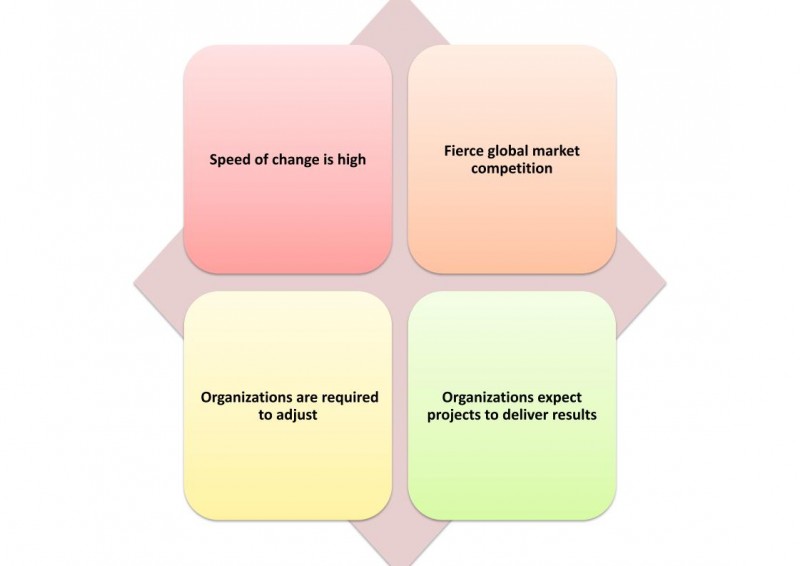As many of you know the PMBoK, the guide used by to get the PMP certification, is coming out this year. Yes, like many of you I am eager to get my copy – #Excited! Luckily PMI members have free access to the electronic version via pmi.org.
Now many of you are asking yourselves why should it change? What is the big deal? And to answer these questions it is important to understand the business and societal landscape in which we find ourselves. A few years ago I proposed a slightly different version of what we all know to be the VUCA model, called DACRI (Diversity, ambiguity, complexity, rapidly-changing, interdependence). This model emphasized that the world has gravitated towards a more diverse, ambiguous, complex, rapidly-changing and interdependent project management landscape. The COVID-19 pandemic has accelerated these factors, while disrupting ‘normal’ ways of working leading to unprecedented changes in business and society.
 These unprecedented challenges have catalyzed the need for companies to enable a more agile and rapid transformations across all fronts. One is for sure; many environmental forces are at play to transform our profession of project management. In PMI’s strategic plan they rightly point out the below forces that require continuous evolution of project management to help “Empower people to make ideas a reality”, which is the essence of project management:
These unprecedented challenges have catalyzed the need for companies to enable a more agile and rapid transformations across all fronts. One is for sure; many environmental forces are at play to transform our profession of project management. In PMI’s strategic plan they rightly point out the below forces that require continuous evolution of project management to help “Empower people to make ideas a reality”, which is the essence of project management:
“The only constant in life is change”-Heraclitus
With the environment changing, the impact on project work is undeniable. According to a report from Accenture, titled ‘Shaping the Agile Workforce’, 79 percent of executives agree that work is shifting from roles to projects. This will impact the new PMBoK.
The new PMBoK – 7th edition
You are probably aware that the new PMBoK will not be following the rules of its predecessors. It will be a rebel of sorts. What do I mean by that? Well, the transformation from the sixth edition to the seventh will imply a few transformative elements. Many people are calling this a “dawn of a new era” in project management. Here is an overview of some of the changes that I was able to research:
What fascinates me the most about the transformation is the focus on project outcomes. This is novel in a way because project management has traditionally focused on outputs. Focusing on outcomes means shifting away from a process approach that can be considered a hallmark of the previous versions of the PMBoK and has been the main focus ever since I can remember being a PMI member.
Processes will no longer be part of the core PMBoK. They will be part of PMI standards + platform. Now do not get me wrong, I am not saying that processes are not important. A process is an activity, or series of activities, that converts an input, to an output, by doing work. Processes exist to add value, achieve outcomes and meet requirements of customers. They are integral in arriving at the desired outcomes. However, when outcomes are at the forefront, they force PMs to “think with to end in mind” as one of my favorite personal development gurus famously said:
“Begin with the End in Mind” – Stephen Covey (1989)
In one of my previous articles (Golden Circle in Project Management), I explained that as Project Managers we often succumb to the pitfall of focusing too much on our outputs, deliverables and processes. This is because the very nature of our craft focuses on adhering to a methodology. We focus on “doing things right” through a sub-set of processes (the “HOW”), while attaining the output of the plan (the “WHAT”).
In this regard, I like how the new PMBoK approach will help to re-orient us towards the outcomes (the “WHY”) of doing things. Help you focus on outcomes vs outputs (and to take it a step further on benefits). The PMBoK is shifting the focus from outputs to outcomes.
Outcome thinking
Outcome thinking is result-focused. It is a mindset behavioral change, which will require many to think differently. Some Project Managers, who have found comfort in processes, will be pushed out of their comfort zone to use judgement and experience to guide outcome-thinking rather than relying heavily on a methodology. Emphasizing outcomes will help foster a generation of Project Manager that “think with the end in mind” rather than comply with processes. This will help us to re-think how we approach our craft.
Many project management professionals have sought comfort in stability and certainty of processes. In the world of yesterday, managing uncertainty required a structured process-focused structure of predictability. This is no longer enough, in our unprecedented, disruptive and unpredictable world – we need to develop project management gut instinct. The world that we live in today is much more complex than ever before. It requires focusing on the outcome and adapting various tools, techniques and methodologies to reach strategic objectives.
Not one methodology is a sure shot for success – actually it never was. Following processes was never enough. That is why when I talk about the new PMBoK as somewhat a revolutionary approach, it will be – and I welcome this new era. It will require many of us who have been brought up through a process approach to unlearn some conventional thinking. It will require us to be bold and dare to deviate from conventional thinking. I have never considered myself a Rebel – but to adapt to the new realities of today and start embedding the ways of working of PMBoK 7th edition, I think I will have to challenge the status quo and become a PM rebel.
To conclude: Be Bold – and dare to deviate to drive outcome!
The next chapter of this journey, will be about competency development and the skills needed to support an outcomes-driven mindset. This is what PMI is calling “Power Skills”. I recently watched a video on a recent PMI Madrid Chapter event, where Ashwini Bakshi was presenting. It was inspirational, to say the least, but what really captured my attention was the evolution of PMI’s Talent Triangle towards what are called “Power Skills”. These skills are unique and focus less so on traditional technical skills of project management and include among others:
- Empathy
- Collaborative Leadership
- Creativity
- Humility and Authenticity
This is inspiring, again a deviation from the norm in project management skills. #PMRebel










